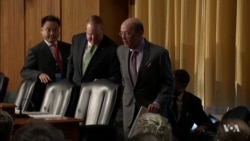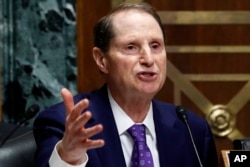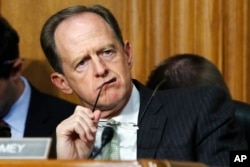Testifying before a Senate panel, U.S. Commerce Secretary Wilbur Ross on Wednesday withstood a bipartisan barrage of complaints and criticism over the Trump administration’s escalating trade battles with China and key American allies.
“I don’t think the Chinese want a trade war any more than we do,” Ross told the Senate Finance Committee. “The president’s general view is that the trade war was lost years ago. This is an attempt to fix outcomes that were unsatisfactory.”
Senators responded with incredulity and, at times, sarcasm to the commerce secretary’s defense of new tariffs announced or contemplated on imports ranging from steel to automobiles.
“A car isn’t a can of soup, Mr. Secretary,” the committee’s chairman, Republican Orrin Hatch of Utah said. “These tariffs do not support U.S. national security. Instead, they harm American manufacturers, damage our economy, hurt American consumers, and disrupt our relationship with our long-term allies.”
“It sounds to me like we got a government-run mercantilist economy, as opposed to a free-market economy,” Iowa Republican Sen. Chuck Grassley said.
WATCH: Lawmakers Grill Commerce Secretary Over Escalating Trade Battles
Ross announced that more than 20,000 U.S. entities have asked the administration for waivers, allowing them to import steel goods tariff-free, of which 42 had been approved so far. He admitted that steel prices have risen in the United States, harming some domestic industries. But he said tariffs are not primarily to blame.
“There has been a lot of speculative activity — storing inventory, withholding product from the market,” the commerce secretary said, adding that the administration is investigating “whether there are people who illegitimately are profiteering” from tariffs.
Colorado Democratic Sen. Michael Bennet countered that tariffs must be to blame for rising costs, since the punitive measures enabled any profiteering taking place. Bennet also expressed consternation over U.S. tariffs on Canadian steel after Ross admitted that the United States does not, in fact, have a trade deficit with Canada on the product.
“What is the national security rationale for putting a tariff on the Canadian steel industry with whom we have a trade surplus?” the Colorado senator asked.
Ross replied that the United States has to respond to steel dumping on a global basis because China “masks” the true volume of steel exports to the United States by shipping products through other countries, including Canada.
“If you just believed the raw numbers, China is shipping less to us than they did five years ago. The reality is quite to the contrary,” the commerce secretary said.
Oregon Democratic Sen. Ron Wyden said he applauds President Donald Trump’s determination to vigorously enforce U.S. trade laws, crack down on China’s trade practices, and update the North American Free Trade Agreement, NAFTA, between the United States, Canada, and Mexico. But Wyden criticized the administration’s performance in pursuit of those goals.
“The administration’s trade moves seem more like knee-jerk impulses than any kind of carefully thought-out strategy. It’s most obvious accomplishment on trade so far is sowing a lot of chaos that has united allies and China against us,” the Oregon senator said. “I’ve heard from Pacific Northwest cherry growers who’ve gotten nearly 1.5 million boxes of cherries ready to ship to China. They’re worried those cherries are going to end up stuck on the dock or rotting in a warehouse due to China's retaliation [on tariffs].”
Ross told senators he backs Trump’s decision to act boldly on trade.
“We tried negotiation. I, myself, have been four or five times in China negotiating over the last year or so,” Ross said. “There have been years of talk with China about intellectual property. The president feels, and I agree, that now is the time for action. And unless we make it more painful for them to continue those practices, it’s unlikely we will succeed.”
Republican Sen. Pat Toomey of Pennsylvania bemoaned a heavy-handed approach to trade.
“We’re picking winners and losers and probably resulting, in my view, in the risk of far more jobs lost than jobs that are going to be gained,” he said. “I wish we would stop invoking national security, because that’s not what this is about. This is about economic nationalism and an economic policy of managing trade.”
Toomey is backing a proposal by a fellow Republican, Tennessee Sen. Bob Corker, that would require congressional approval for tariffs levied for national security reasons. The Senate declined to vote on the bill last week, but Corker and other backers have vowed to continue fighting for the measure.










